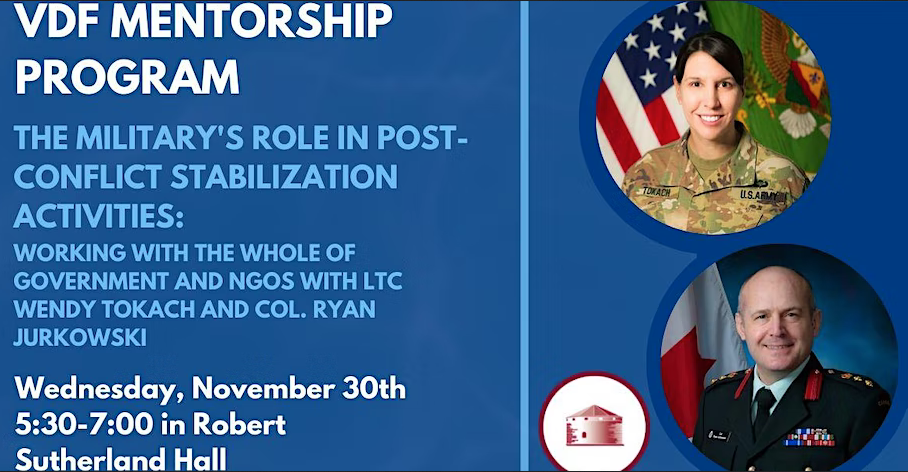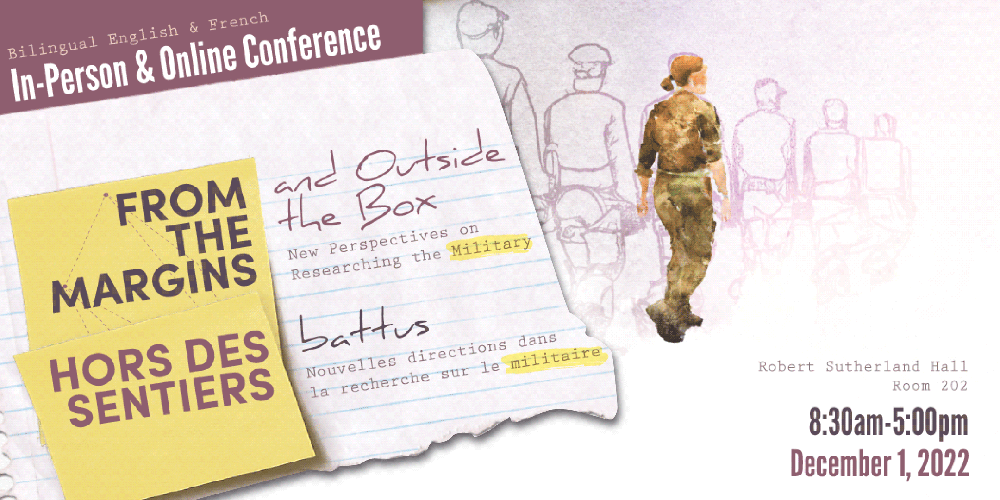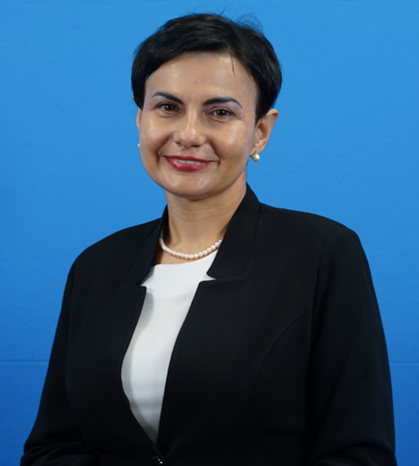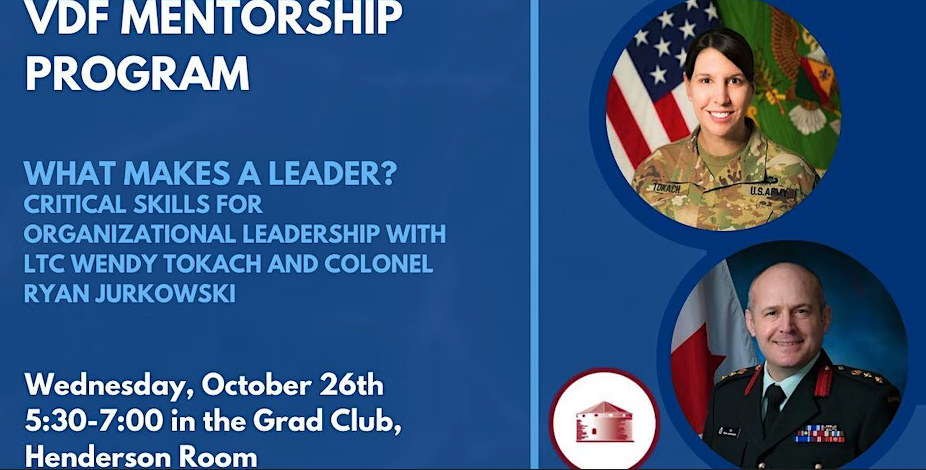INTERVIEW PARTICIPANTS NEEDED
The Military's Role in Post-Conflict Stabilization Activities
Date
Wednesday November 30, 20225:30 pm - 7:00 pm
Location
Queen’s University, Robert Sutherland Hall | Room. #355
As part of the VDF mentorship program for undergraduate skill building.
The Military's Role in Post-Conflict Stabilization Activities: Working with the Whole of Government & NGOs
LTC Tokach and Col. Jurkowski will be discussing cooperation in post-war stabilization, focusing on a UN, NATO and Coalition lens.
some food and drink will be provided.
From the Margins and Outside the Box : New Perspectives on Researching the Military
Date
Thursday December 1, 20228:30 am - 5:00 pm
Location
Queen’s University, Robert Sutherland Hall Rm. 202 | Online via Zoom
french to follow.
Download the English Program & Bios | Télécharger le programme et les bios
Often called out for its lack of diversity and inclusion, it is not only the military institution that needs to change, but also the way it is studied. For far too long, research on the military has been siloed. Few dialogues and consultations among researchers were taken place, either because their research field was distinct (political science, sociology, anthropology, history, applied ethics, and so forth) or because they were working for different institutions (academic or governmental). Now more than ever, marginalized approaches and perspectives in the study of international security need to be heard and seen as they can bring answers to some of the challenges the military institution is currently facing.
By bringing together researchers – virtually and in-person – from different countries, this conference aims to delve into how the military institution can be researched from more perspectives than we usually imagine when we think of the military. It is about paying attention to what underrepresented researchers, researchers using underrepresented approaches or working on underrepresented topics, can bring to the table. But it is also about opening a space for researchers – and the public – to share and learn from each other.
The conference is hybrid. Public is welcomed either in person or virtually.
This is a bilingual event. Live interpretation will be available to all attendees.
------------
Hors des sentiers battus: nouvelles directions dans la recherche sur le militaire
Régulièrement interpellée pour son manque de diversité et d’inclusion, ce n’est pas seulement l’institution militaire qui a besoin de changer, mais aussi la manière dont elle est étudiée. Pendant trop longtemps, la recherche sur le militaire s’est faite en silo. Trop peu d’échanges et de discussions entre chercheur.e.s prenaient place, parce qu’ils appartenaient à des disciplines différentes (science politique, sociologie, anthropologie, histoire, éthique appliquée, etc.) ou parce qu’ils travaillaient pour des institutions différentes (universitaires ou gouvernementales). Maintenant plus que jamais, il est important de prêter davantage attention aux approches et perspectives considérées qui comme marginales dans le champ de la sécurité internationale, et ce parce qu’elles peuvent apporter des réponses à certains des défis que l’institution militaire doit actuellement affronter.
Rassemblant des chercheur.e.s – virtuellement et en personne – de différents pays, cette conférence a pour objectif d’explorer comment l’institution militaire peut être analysée de davantage de façon qu’on tend à imaginer lorsqu’il est question du militaire. C’est à propos de ce qu’on peut apprendre si on prête attention à ce que les chercheur.e.s sous-représenté.e.s, les chercheur.e.s ayant recours à des approches sous-représentées, ou travaillant sur des sujets sous-représentés, font. Mais l’objectif est aussi d’ouvrir un espace au sein duquel chercheur.e.s – et public – peuvent partager et apprendre des autres.
La conférence est hybride. Le public peut y assister en présence ou virtuellement.
PROGRAMME AGENDA:
8:30 am - Opening words – conference’s structure
8:45 am - Panel #1 : Participatory Research within the Military Institution: From Observation to Action-Research in the Service of Servicemembers
This panel focuses on how participatory research offers an original and relevant perspective when it comes to the analysis of the military institution and its members. Using different perspectives (sociology, anthropology, applied ethics, etc.) and relying on different case studies (France, the Netherlands and Canada), the four researchers in this panel will present their work, as well as how they used this methodological approach in their respective research. Participative research contributes to a better understanding of issues such as the integration of women into the armed forces, the psychological suffering suffered by certain members, or more generally the ways to improve the situation of active members, veterans, and their relatives. As such the contributions of participatory research should not be overlooked.
Panelists:
- Marguerite Déon
- Léa Ruelle
- Elizabeth Suen
- Amber S. Spijkers
10:00 am - BREAK
10:15 am - Panel #2: Lived Experiences Under Scrutiny: Learning from the Servicemembers Themselves
This panel is about lived experiences, and how a better understanding of what is happening at the individual level can potentially help to better understand – and thus ultimately improve – what is occurring at the institutional level. Lived experiences make it possible to better understand the trajectory of individuals and how they are coping when confronted with obstacles at certain points of their lives. Soldiers’ lives courses in particular are known to be chaotic. Learning for instance about their experiences on the battlefield, or their transition out of the military, can enable the armed forces to better prepare its members when, or if, they face these situations.
Panelists:
- Dr. Jennifer O’Neil
- Dr. Michelle Jones
10:55 am - BREAK
11:00 a.m. - Panel #3: Representation of Gendered and Sexual Identities: Toward a More Inclusive and Diverse Military Institution
This panel addresses the question of gender and sexual identities – as well as their integration – within the military, and how this issue has become central to most armed forces in democratic countries. Indeed, the military institution has long been synonymous with hyper-masculinity and heteronormativity. Those who did not match to the expected image and qualities of a soldier did not necessarily find their place within the institution, and were sometimes the target of inappropriate behaviour, harassment or violence. If today’s and tomorrow’s military wants to pursue the agenda of inclusion and diversity that it has set itself, it requires a better understanding of what some of its members are going through as well as the implications this has for them, as shown by the researchers on this panel.
Panelists:
- Dr. Pooja Gopal
- Dr. Linna Tam-Seto
- Dr. Rachel Yon & Major Rex Steel
12:00 pm - LUNCH
1:00 pm - BOOK PRESENTATION: Dr Grazia Scoppio & Dr Sarah Greco
The Power of Diversity in the Armed Forces. International Perspectives on Immigrant Participation in the Military
While countries throughout the world rely on immigrants to support their populations and economies, access to the military is limited, denied to those who have not yet acquired citizenship. Precluding immigrants from serving in their host country’s armed forces is an issue of moral equity and operational effectiveness. Allowing immigrants to enlist ensures that the military represents the population it serves and encourages inclusivity and cultural change within the institution, while also creating a more effective military force. The Power of Diversity in the Armed Forces investigates how different countries approach the inclusion or exclusion of immigrants in their armed forces and offers immigrant military participation as a pathway to citizenship and a way to foster greater societal integration and achieve a more equitable, diverse, and inclusive military. By surveying international perspectives on immigrant and non-citizen military participation in twelve countries, The Power of Diversity in the Armed Forces introduces and examines a new way to unlock the power of diversity in military organizations globally.
1:40 pm - BREAK
1:45 pm - Panel #4 : For a Culture Change: Capturing the Military’s Institutional Evolution
This panel tackles the question of military culture, and the difficulties that lie not only in analyzing it, but specifically in changing it. Having become a matter of importance, particularly in Canada, due to the problematic behaviours associated with it, military culture nonetheless remains complex to approach as an object of study. The researchers on this panel approach the issue from different but complementary angles.
Panelists:
- Dr Isabelle Richer
- Major (retired) Marshall Gerbrandt
- Dr. Tamir Libel & Dr. Krystal Hackey
2:40 pm - BREAK
2:55 pm - Panel #5 : State Power and Military Force: A Complex and Changing Relationship
This panel focuses on the relationship between the state and the armed forces, a relationship that has evolved over time and space, and which influences the way power and strength are more generally apprehended. As the researchers on this panel will demonstrate, this relationship evolves depending on the context, including when a country is in a period of conflict, even if a state claims to be neutral. Nationalist discourses can also influence this relationship, as the presence of third actors, who do not always recognize one or even both institutions. Finally, and despite the possibilities offered by new technologies, such as artificial intelligence, we must remain cautious about the transformative potential of these new technologies, as it will be shown in this panel.
Panelists:
- Arthur Servier
- Manaswini Ramkumar
- Benjamin Toubol
- Jacob Gateau
4:05 pm - BREAK
4:10 pm - KEYNOTE: Dr. Maria Rost Rublee
The State of Diversity in Canadian Studies
In this presentation, Dr. Rublee explore the state of diversity in Canadian security studies, including demographic representation, methodological choices, and topics. Based on a multi-method investigation, she argues that Canadian security studies do not reflect the diversity of scholars and students studying it, nor the diversity of the Canadian population.
4:55 pm - Closing remarks
IDPS - How Russia’s Hybrid Warfare is Changing? with Dr. Marzena Żakowska
Date
Wednesday November 16, 202212:00 pm - 1:00 pm
Location
Online Webinar over ZoomHow Russia’s Hybrid Warfare is Changing?
The study aims to examine Russia's hybrid tactics below the threshold of conventional war used against Georgia and Ukraine to secure the sphere of influence by destabilizing those states' internal security and territorial integrity. The research focus is on analyzing hybrid methods used by Russia, to include: (i) "borderization" policy; (ii) separatist movement and local unrest (iii) disinformation campaign. The study's methodological framework is based on the clash of interests approach and Gerasimov's doctrine of non-linear warfare. Evidence suggests that the Georgia War of 2008 and Ukraine War of 2014-2021 best demonstrate the reality of Russia’s approach to hybrid war. However, comparison with the Ukraine War since February 2022 suggest that some hybrid war measures may be changing.
The earlier wars suggest that Russia’s hybrid tactics are the first step to "opening the door" to Outimplement a military operation in other states' territories. Russia undermines the sovereignty of the targeted states through election meddling to establish pro-Russian local government and induces widespread disinformation to build pro-Russian sentiments in the targeted society. Gerasimov’s doctrine of non-linear warfare does accept the reality of conventional means of war being used, but the war since February 2022 suggests that hybrid war approaches as used in the earlier wars did not achieve Russian ends, thus leading to the use of traditional conventional means that call into question the utility of hybrid war. This allows for identifying determinants that show how Russia’s hybrid war is changing.
This study is part of the research project developed in cooperation with professor Larry P. Goodson from U.S. Army War College.
Keywords: hybrid warfare, hybrid tactics, Russia, Ukraine, Georgia, borderization policy, separatist movement, local unrest, disinformation
Speaker

Dr. Marzena Żakowska
War Studies University, FNSWSU
Marzena Żakowska is an assistant professor and lecturer at the National Security Faculty at the War Studies University, FNSWSU. She holds a Ph.D. in Security Science from the National Defence University, Warsaw, Poland. Currently, she is Director of the Global Affairs and Diplomacy Studies at FNSWSU and Chair of the War Studies Working Group at the International Society of Military Sciences. Professional associations include the Academy for International Conflict Management and Peacebuilding and the United States Institute of Peace in Washington, D.C. She is also a Research Fellow at the Royal Military College of Canada and the US Army War College. As editor and author, she has published books and articles on the subject of armed conflict, hybrid threats, security, and social security issues. Recently she worked on the project “Modern War and Grey Zones” with prof. David Last from the Royal Military College of Canada and project “How Russia’s Hybrid Warfare is Changing?” with prof. Larry Goodson from US Army War College.
Emma Fingler

Emma Fingler
PhD Candidate/Researcher
Political Studies
Emma Fingler (she/her) is a SSHRC-funded doctoral candidate researching gender, disaster response operations and regional governance in South and Southeast Asia. She is a Canada-Asia Young Professional Fellow with the Asia Pacific Foundation of Canada. She also holds a doctoral scholarship funded by the Research Network on Women, Peace and Security at McGill University. Prior to joining Queen’s, she was the Special Assistant to the Resident Coordinator of the United Nations (UN) in Nepal and a Junior Professional Consultant with the UN. She holds an M.A. in Global Governance from the University of Waterloo’s Balsillie School of International Affairs and a B.A. Hons Political Studies from Bishop’s University.
Research Interests:
- Humanitarian and disaster governance;
- Women, Peace and Security agenda, with a focus on the Association of Southeast Asian Nations (ASEAN); and
- Global governance structures and norms.
- Linked In: https://www.linkedin.com/in/emma-fingler/
Meaghan Shoemaker

Meaghan Shoemaker
Fellow
Meaghan holds a PhD in Political Studies from Queen’s University and currently works with Canada’s Department of National Defence. From 2015 to 2019, she was the project lead for the Centre for International and Defence Policy’s Gender Lab. Meaghan’s work to date has focused on opportunities for improved inclusion and diversity in defence institutions and international organizations.
Meaghan has published on Canadian defence policy, human security, and diversity, and has contributed to forums such as The Conversation Canada, The Globe and Mail, and the NATO Association of Canada.
Meaghan also provides training and education for national militaries, facilitating conversations with members across all ranks on the topics of emotional intelligence, mentorship, unconscious bias, microaggressions, and human rights.
Currently, along with co-editor Dr. Linna Tam-Seto, she is publishing an edited volume with McGill-Queen’s University Press focused on the gender dimension of veteran transition in Canada.
Research interests:
- Defence policy
- International organizations (NATO; UN)
- Critical feminist security studies
- Human security
- Military personnel
Michael P. A. Murphy

Michael Murphy
Banting Postdoctoral Fellow
Political Studies
Robert Sutherland Hall, Rm 409
Michael P. A. Murphy is a Banting Postdoctoral Fellow in the Department of Political Studies at Queen’s University and Centre for International & Defence Policy. His research focuses on International Relations theory and higher education pedagogy. He is the author of Quantum Social Theory for Critical International Relations Theorists (Palgrave, 2021), over thirty peer-reviewed articles, and numerous book reviews and chapters. He serves as Editorial Assistant at Security Dialogue, and is the 2022-2023 President of the Active Learning in International Affairs Section of the ISA.
Critical Skills for Organizational Leadership
Date
Wednesday October 26, 20225:30 pm - 7:00 pm
Location
The Grad Club | 162 Barrie Street Kingston, ON K7L 3K1
As part of the VDF mentorship program for undergraduate skill building.
VDF Mentorship Talk - What Makes a Leader? Critical Skills for Organizational Leadership
This meeting will begin with a short lecture on what it means to be a leader in organizations and the skills required, led by LTC Wendy Tokach. Following the initial talk, the floor will open up to discussions about leadership, or any other questions students may have relating to the field of international defence and security.
